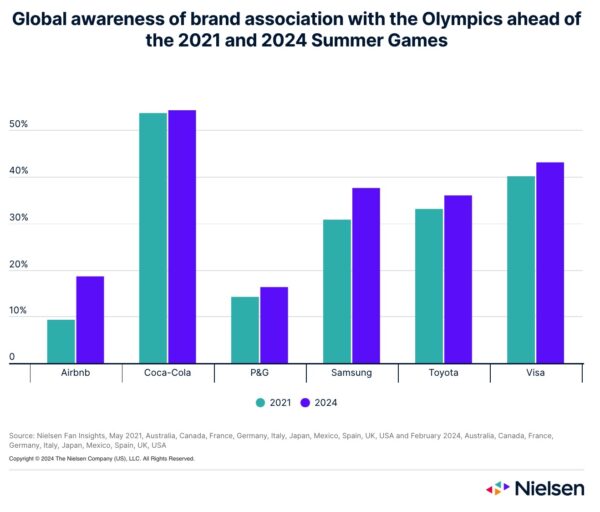Top brands are like Olympic athletes [INSIGHTS]
July 17, 2024

Visa first partnered with the Olympics in 1986, Samsung in 1988, Coca-Cola in 1928. Talk about long-term brand building. Like Olympic athletes who train their whole lives for a moment in the spotlight, the world’s top brands know that clutch performance comes from long-term investments.
With the 2024 Olympics here, let’s use some new data to review how brands are using long-term sports sponsorships to build brand equity.
Olympic sponsors score big on brand awareness
These days, marketers tend to be judged on their ability to create consumer demand, generate sales, and deliver immediate returns on their ad spend, but top brands know better than to ignore top-funnel metrics. We’ve studied thousands of campaigns over the years and found that on average, a 1-point gain in top-funnel brand equity metrics—like brand awareness and relevance—drives a 1% increase in sales.
The Olympics provide a great example of the impact that long-range sports partnerships can have on brand awareness. A little more than 40% of global consumers were aware of Visa’s association with the Olympics ahead of the Tokyo Games in 2021, and that figure has increased three points to 43% as of May 2024. It jumped two points in France (from 29% to 31%), five points in Australia (from 33% to 38%) and twelve points in the US (from 37% to 49%).
You can find insights about Visa and other Olympic partners on our Olympic Insights Hub, an online resource we launched recently to share data about fans, brands and athletes throughout the summer. For instance, P&G’s association with the Olympics has gained two points in awareness between 2021 and 2024, Samsung’s seven points, and Airbnb’s nine points (figure 1).

Tying long-term goodwill to current fan enthusiasm
The brands above are not resting on their laurels and have been making the most of their association with the Olympics in recent months. From January to May 2024, Visa has spent nearly $29 million on advertising, Airbnb $250 million, and Coca-Cola over $440 million, according to new data from Nielsen Ad Intel.
Since the beginning of the year, nearly 80% of total ad spend from this year’s Olympic sponsors has gone to television, but every market is different. In Germany and Indonesia, for instance, more than half of Coca-Cola’s media budget went to online channels, and in the UK, two-thirds went to outdoor channels.
Wherever they may be, sports fans are simply more likely than the general population to engage with sponsors and purchase their products. By advertising around the Games, Olympic sponsors can capitalize on fan enthusiasm and years of goodwill: short-term and long-term marketing working hand in hand.
Measuring success holistically
Brand awareness is crucial—consumers rarely buy from brands they don’t know—but the benefits of long-term sports sponsorship go well beyond awareness. And measuring success should be an integrated endeavor.
“We think about measurement holistically,” said Molly Beck, Strategy and Planning Lead for Google’s Center of Excellence for Sports Marketing in a recent Nielsen webinar on driving value through women’s sports. “We’re looking at broadcast reach and views as we always do, as we always will, but being a fan… is more than just tuning in on Saturday night for this or that game.” Streams, game highlights, tickets, scores, following a player on TikTok and shopping for a new signature shoe line are all part of the fan experience, and therefore a part of the measurement equation too. “As a brand, you’re only going to get so much value from showing up courtside. A lot of it is going to come from how the fan is consuming around that moment, before that moment and after that moment.”
That’s where a long-term partnership pays off. For WNBA Chief Growth Officer Colie Edison, “Many brands are trying to seize the moment…but if you don’t have the patience to actually do a multi-year investment, you won’t make the most of your relationship.”
In our interviews for the 2024 Annual Marketing Report, Adam Isselbacher, SVP, Group Director Research & Analytics at UM Worldwide concurred and reminded us that “brand building is not just about making a brand visible. It’s about embedding into the consumer consciousness.” That takes time.
For even more insights, CLICK HERE





























